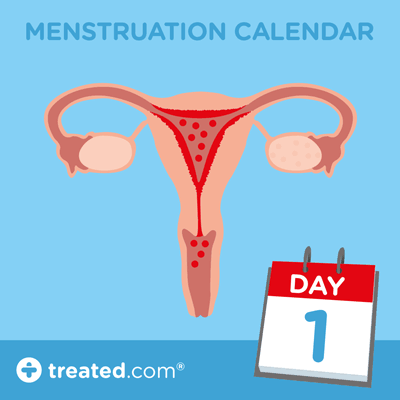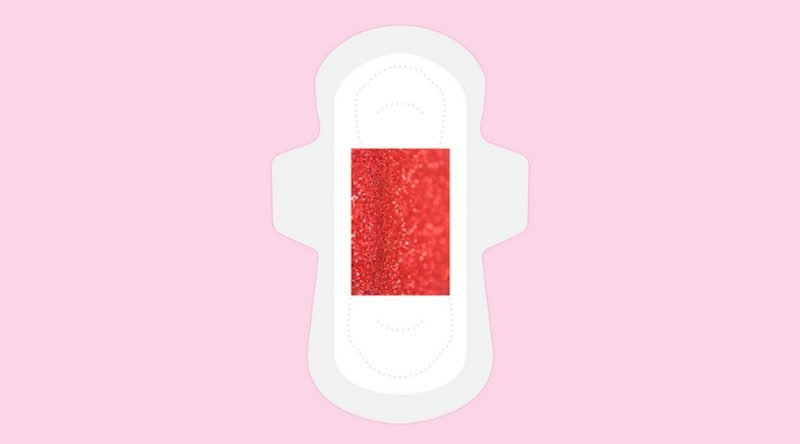How do periods work?
Bleeding once a month can be a pretty weird experience when you first go through it. So how do they work?
When people who have periods to go through puberty, their bodies start to change. As the hormones that trigger puberty start to take effect, your menstrual cycle, or period, will begin. This usually happens around the age of 11, and most people’s periods will start by the age of 14 – but it could happen at any point between the ages of 8 and 17 years old! Let’s look at this in more detail.
Note: we use the phrase ‘people with periods’ in this article because not all people who experience menstruation are women or girls, and equally, not all women and girls have periods. Non-binary people, trans men, and other gender non-conforming people might menstruate, and some cisgender women might not have periods for lots of different reasons. We use this phrase to make sure everyone is included.

What is a menstrual cycle?
The term ‘menstrual cycle’ refers to the journey your body goes through every month. It’s sometimes used to describe your period itself, because that is what begins the cycle, but this is just one stage in a process that lasts an average of 28 days.
There are four stages of the menstrual cycle:
- Menstruation – period bleeding
- Follicular – an egg grows in the ovary
- Ovulation – one of your ovaries releases an egg
- Luteal – your body prepares for a potential pregnancy
In the middle of your menstrual cycle, your body ovulates. The egg travels down your fallopian tubes to your uterus, where it hangs around for about 12-24 hours. Even though ovulation lasts up to 24 hours, if the egg runs into any sperm days before or after ovulation, you can still get pregnant.
Every month during this process, your womb or uterus builds a thick lining that will help you get pregnant. This lining, which is mostly made up of blood, is shed by your body and exits your uterus through the vagina if you don’t get pregnant. If you do get pregnant, the lining delivers nutrients to the baby growing in your uterus – so your period stops.
What will my period look like?
We all know what blood looks like, but period blood can be quite different to the kind you get from a paper cut. It can range through a lot of different colours from pale pink to dark brown, and varies a lot in consistency.
Sometimes you may pass thick or clotted blood while on your period, and sometimes it will be pale and watery – this is all completely normal. It can feel as though you are bleeding a lot, but the average person will only pass between three to five tablespoons of blood over the course of their period. If you are worried about how heavily you are bleeding during your period, go and have a chat with your GP.
How long will my period last?
A period normally lasts between 3 and 8 days, but for the average person will last about 5 days. However, some people will experience longer and shorter periods than this, especially when first settling in to their cycle.
The first 2 days will normally be the heaviest in terms of bleeding. However, there will also be months where the bleeding is lighter or heavier than usual across the board. This is all normal!
Why is my cycle so irregular?
We’ve already talked about the average cycle lasting around 28 days. However, it’s very common for periods to start sooner or later than this; they can range from anything between 20 and 40 days apart!
When your period first starts, it can take a while for your body to settle into a regular cycle. So don’t worry too much if things can be a bit hit-and-miss. If your period is very late and you’re concerned, go and see your GP.
How can I manage my period?
There are lots of different products that can help you manage your period. Lots of people use pads or tampons, which you can buy at most supermarkets and chemists. Menstrual cups are also becoming increasingly popular. Take the time to figure out what works for you.
In the UK, you should now be able to get period products for free at your school or college.
What are some of the common side effects I might experience?
Everyone experiences their menstrual cycle differently. For some people, it will rarely cause any trouble besides the minor inconvenience of some blood in your underwear. However, periods can sometimes be uncomfortable or painful. It is not unusual to experience cramps in your lower stomach before or during your period, and some people can also feel sick. This is because your womb is contracting as it gets ready to get rid of the lining of your uterus.
Some things that might help with this:
🔴 Taking a painkiller, such as paracetamol or ibuprofen.
🔴 Placing a hot water bottle or hot beanie over your tummy.
🔴 Having a hot bath.
🔴 Taking some gentle exercise, such as a brisk walk, or some stretching.
If the pain is so much that it’s restricting your daily activities, you could have a chat with your GP about how to best manage your symptoms.
You may also feel unhappy, cross, or generally blue around the time of your period. This can be part of something called premenstrual syndrome, or PMS for short.
In summary…
Having a period is a natural and normal part of growing up, and a sign that your body is working the way it’s supposed to! It’s not wrong or dirty, and you should never feel embarrassed by it.
Happy perioding!
Other support
Read more
Last Reviewed 21 June 2023
Image Credit: Fumble





